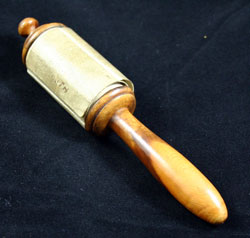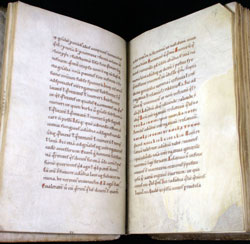This semester, Special Collections will be turning the spotlight on our patrons each month by highlighting teaching and student work inspired by the collections. This post kicks off the semester and focuses on the teaching of Julie Christenson. Julie visited Special Collections with her section of Humanities 2111H (The Ancient World; part of the Honors Humanities Sequence). We corresponded with her via email to get her thoughts on Special Collections and undergraduate instruction.
SC: Can you give us some information about yourself?
I am a graduate student instructor in the English department. I am writing my dissertation on the poetics of commemoration in medieval England. I am interested in the poetic strategies of texts designed to commemorate events and figures.
SC: How did you incorporate Special Collections into your teaching last semester?
My students came for two visits. On their first visit, Kelli Hansen introduced several pieces from the collections that were relevant to the texts my students were studying. For their second visit, each student worked with one of the pieces that had been introduced during the previous session. They used their observations as the basis of a 2–3 page manuscript analysis.
SC: What outcomes resulted from your class visits? What were the effects on your students?
I think it’s good for students to realize that classical and medieval literature served a vital function within much different material, social, and aesthetic frameworks. There is just no comparison to experiencing a one-of-a-kind book, seeing the hole in the parchment where the animal had been bitten by a mosquito, to seeing the pages darkened from generations of hands turning the pages.
 SC: What advice would you give to faculty or instructors interested in using Special Collections in their courses?
SC: What advice would you give to faculty or instructors interested in using Special Collections in their courses?
I understand the hesitation to take time out of our already cluttered schedules to what might seem like a frill, but my advice is to squeeze in a visit. It will enhance the work you do everyday in the classroom. Your students will be able to forge an experiential connection with the periods you are studying. That experiential basis convinces and inspires in a way that complements the work we do in the classroom.
Stay tuned – tomorrow we'll be sharing some of the student work that resulted from Julie Christenson's class visit.